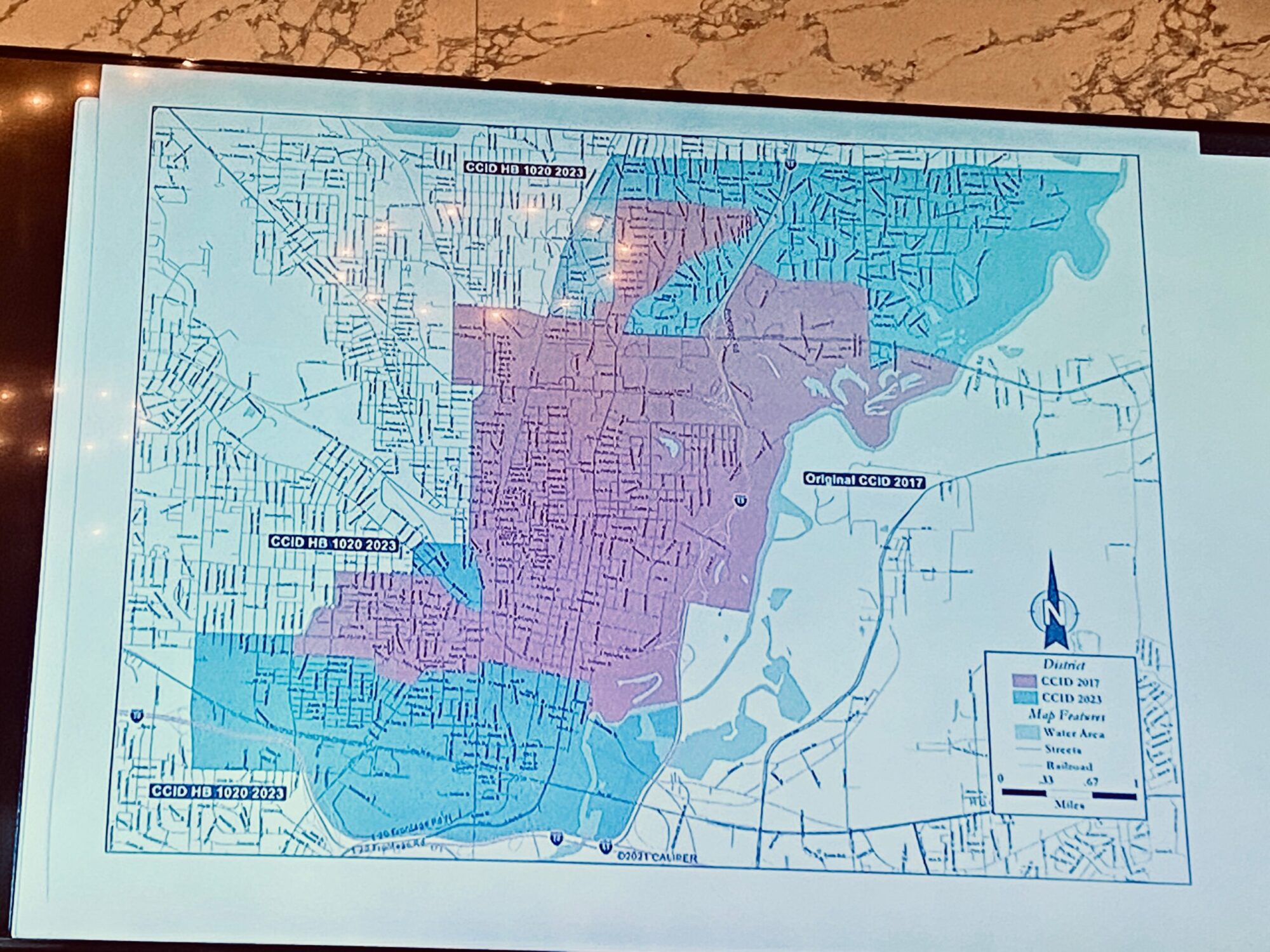
New proposed boundaries of the CCID in Jackson according to HB 1020
The new law expands the CCID and the Capitol Police’s jurisdiction while providing for a new inferior court and additional resources for the Hinds County court system.
House Bill 1020, a controversial bill aimed at expanding the Capitol Complex Improvement District (CCID) in an effort to fight crime in Jackson, has just become law in Mississippi.
The bill comes at a time when Jackson’s crime rate continues to increase. While Jackson is only 6% of the state’s overall population, it has accounted for more than 50% of the state’s homicides in past years.
RELATED: Legislature approves new court system within CCID and additional judges for Hinds County
Governor Tate Reeves signed the bill on Friday, the deadline for him to either sign or veto the legislation.

Upon signing the bill into law, Governor Reeves stated:
The fact is that Jackson has so much potential. It is our capital city and the heart of our state. It is where I have lived for over one-third of my life. But Jackson has to be better. Downtown Jackson should be so safe that it is a magnet for talented young people to come and live and work and create. This legislation won’t solve the entire problem, but if we can stop one shooting, if we can respond to one more 911 call – then we’re one step closer to a better Jackson. I refuse to accept the status quo. As long as I’m Governor, the state will keep fighting for safer streets for every Mississippian no matter their politics, race, creed, or religion – regardless of how we’re portrayed by liberal activists or in the national media.
After the measure was signed, State Representative Trey Lamar (R), the bill’s author, said this was a victory for Jackson residents.
“From its beginning, House Bill 1020 has been a sincere effort to help make our capital city safer for our citizens. I applaud Governor Reeves statement today and appreciate him agreeing with the Legislature’s substantial work to improve and invest in Jackson,” said Lamar. “Today is a victory for the good, law-abiding people of Jackson as well as all Mississippians who want to be proud of our capital city. May God continue to bless Mississippi and her people.”
However, not all lawmakers were in favor of the signing.
State Representative Robert Johnson (D), leader of the House Democratic Caucus, shared his disapproval of the passage of the bill. He spoke out on several occasions against the bill during the 2023 session.
“I am disappointed that the Governor has shown the same irresponsible shortsightedness that the House and Senate leadership displayed by authoring and passing a piece of legislation that is poorly written and unconstitutional among other things,” said Johnson in a statement to Magnolia Tribune. “The Governor should have vetoed this legislation and recommended that some real thought and cooperation be invested in this effort instead of rushing it through this session.”

Johnson said he believed the Governor should have taken the opportunity to admonish the Lt. Governor and Speaker of the House for spending time on this effort and instead focus more on keeping hospitals open and reinstate the ballot initiative process.
What the new law does
One of the larger components of the legislation is that it expands the current boundaries of the CCID. The new boundaries would run from the furthest point of Northside Drive, over to the railroad, then past Highway 80, going as far west as Ellis Avenue.
It also increases the jurisdiction for the Capitol Police force throughout the city, with more transparency through requirements for body cameras. Capitol Police would only maintain primary jurisdiction within the CCID but could assist the Jackson Police Department, if necessary, throughout the city.
Lastly, the new law establishes an inferior court system within the CCID. The Chief Justice will appoint the inferior court judge. This court will expire in 2027. HB 1020 also provides additional resources to the Hinds County court system in the form of an additional appointed judge as well as several Assistant District Attorneys and Public Defenders. The ADA’s and defenders would remain permanent, while all special temporary judges would expire in December 2026.
The state was already funding three special temporary judge placements for Hinds’ Seventh Circuit Court district.
The expansion of the CCID and the jurisdiction of Capitol Police would not go into effect until June 2024. The effective date was pushed back from initial discussions to give the Capitol Police time to implement the necessary administrative adjustments.
The Capitol Police is currently operating with just under 120 officers. This will enable the force to increase to 150.
In order to provide financial support for these changes, the legislation increases the sales tax diversion for the CCID from 6% to 9%, a 50% increase. The CCID reported in their Thursday quarterly meeting that revenue had dipped from $800,000 to near $700,000 in recent months.
Lack of bipartisan support
HB 1020 drew fiery criticism while moving through the Legislative process. State Representative Lamar and others supporting the bill were openly accused by Democrats of racism.
At the House well, Lamar refuted any notion that the bill had a racist intent. He maintained that it came from an attempt to help the city of Jackson fight its dramatic increase in crime.
“I’m doing this for the right reasons in my heart and I can sleep at night. Because I know the only color that should matter is red, and my heart bleeds red, too,” said Lamar prior to the final vote on the bill.

Many Democrats, and several in the Jackson and Hinds County delegations opposed the bill. They suggested sending the funding directly to the city of Jackson instead of through the CCID. They also pointed to backlogs within the State Crime Lab as a major component in the court system’s hold up of prosecutions.
Members of Jackson delegation in both chambers called the bill a “step backwards” in the state’s support of the capital city.
The Legislature established the CCID in 2016. The initial CCID legislation was intended serve as a road and infrastructure bill that could be used to provide support for buildings and areas within Jackson that are largely used by state agencies.
The NAACP and the ACLU have stated that they are considering filing legal action to challenge the new law.










